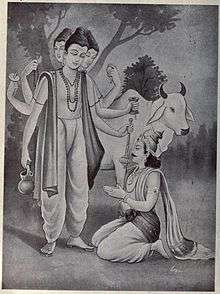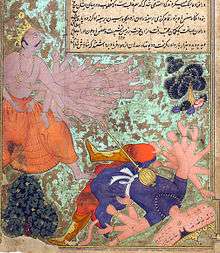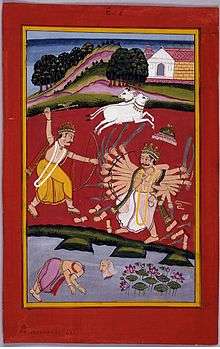Kartavirya Arjuna
| Kartavirya Arjuna | |
|---|---|
 Dattatreya gives boon to Arjuna |
Kartavirya Arjuna (Sanskrit: कार्तवीर्य अर्जुन, Kārtavīrya Arjuna; also known as Sahasrabahu Arjuna) was a legendary king of an ancient Haihayas kingdom with capital at Mahishmati which is on the banks of Narmada River in the current state of Madhya Pradesh. Kartavirya was son of Kritavirya, king of the Haihayas. This is his patronymic, by which he is best known; his real name was Arjuna. He is described as having a thousand hands and a great devotee of god Dattatreya. On of the several such accounts states that Kartavirya Arjuna conquered Mahishmati city from Karkotaka Naga, a Naga chief and made it his fortress-capital.[1]
Birth
During the time Ravana ruled over the heavens and the earth, there lived a king called Kritavirya who ruled Mahishmati. Though he had many wives and he performed several penances, he remained childless. One of his wives Padmini, unable to bear the anguish of the King approached Anusuya, the daughter of rishi Kardama and Devahuti and the wife of rishi Atri. Anusuya told her of the days to perform the penance so that the King and Queen would get their heart's desire. So Padmini and Kirtavirya went to the forest and strictly prayed to Lord Dattatreya. Pleased with their devotion Lord Dattatreya appeared before them and granted them a boon, that they would give birth to an illustrious son whom no one except Lord Vishnu could defeat. Soon after a son was born to Kirtavirya and Padmini and he was named Kartivirya Arjuna who was born with a thousand arms due to which he was also called as Sahasra Arjuna (One with thousand arms).
Rise and Fall
Penance to Dattatreya
After the death of his father, Kartavirya did not immediately accept the throne. He decided that he should be worthy to rule the world and for that he would have to acquire Yogic powers. His preceptor Garga Muni advised him to perform a penance to please Sage Dattatreya, son of Atri.
So Kartavirya went to the hermitage of Dattatreya and rendered service to him for 10,000 years. He underwent rigorous penances to please the sage. At the end of that period, Dattatreya agreed to grant boons to Kartavirya.
Kartavirya acquired the following boons from Dattatreya: a 1000 exceedingly quick, strong and powerful human arms which would not be very burdensome, which could regenerate when cut off and could appear and disappear at his will; conquest of the whole earth with his own prowess; the ability to discharge his duties and responsibilities as a king and Kshatriya and fulfil them successfully; knowledge of Dharma, law and justice; victory over his enemies; invincibility over humans and all other races; knowledge of customs of others; inexhaustible wealth; ability to feed superior Brahmanas; ability to prevent catastrophes which may harm the kingdom; devotion to Dattatreya and death in battle at the hands of a warrior more superior to him in all the three worlds.
Dattatreya granted Kartavirya all these and more. He gave the Haihaya a golden chariot measuring 4000 cubits which could go anywhere in the sky, earth or underground unobstructed and drawn by a hundred horses. He also gave Kartavirya some Yogic powers as well as divine and esoteric missiles and weapons.
Having acquired all these boons, Kartavirya became exceedingly powerful. Dattatreya however warned Kartavirya that these boons were subjective to his observance of Dharma. Should Kartavirya deviate from righteousness, many of his boons would fail.
Reign
Kartavirya Arjuna came to power thanks to the boons of righteousness and invincibility, along with a thousand strong human arms and a divine chariot he had acquired from Dattatreya. For 85,000 years, Arjuna ruled the earth with prosperity as a Chakravartin Samrat. Nothing was lost and no one was harmed. Kartavirya acquired Yogic Powers and caused rain to fall at his wish. However towards the end of this period, all the kings suffered a diminution in wealth and were unable to rule well. Hence the Kshatriyas levied heavy taxes on their subjects and punished anyone who failed to do so. Soon they got carried away and became tyrannical in nature. Some Kshatriyas discovered that the Brahmanas were hoarding wealth and they were refusing to share it. Kartavirya believed that the Brahmanas wanted to grab his power for their own use and perceived them as unrighteous people and began to oppress the Brahmanas. The Brahmanas, tired with long lifespans wanted to attain salvation quickly. Hence they used the Kshatriyas as instruments for their deaths by conjuring wealth by their spiritual power.
The diverse clans of the Rakshasas, the Asuras, the Gandharvas and the Yakshas took advantage of this as means of consolidating power from Kartavirya. Many vassals of the Haihayas opposed the oppression of the Brahmanas and rebelled against the emperor. Wars broke out and made Kartavirya delusional. He used brute force to suppress them for the time being, but he himself lost the true meaning of Dharma and became a tyrant. Other kings followed his example and thus the Kshatriya race became violent and cruel, no longer benevolent and protective towards their subjects.
Encounter with Ravana

Kartavirya's power is popularly told in the Ramayana. He was the contemporary of Ravana. The story goes that once when Kartavirya Arjuna was having a bath in the river Narmada along with his wives, he stopped the force of the river with his thousand arms from both the sides. The teenage Dasagriva (Ravana), who was singing the hymns of Shiva and praying to him, made him lose his concentration. Enraged, he challenged the former for a combat. Ravana was defeated and was put to humiliation.Then on request of his paternal grandfather Pulastya the great emperor Kartaviryarjuna released Ravana.
Another account states that when Ravana came "in the course of his campaign of conquest to Mahishmati (the capital of Kartavirya), he was captured without difficulty, and was confined like a wild beast in a corner of his city."
The Vayu Purana states that Kartavirya invaded Lanka, and there took Ravana as prisoner, but later he was killed by Parashurama and Ravana was rescued from Karthavirya.[2]
Encounter with Parashurama

In the Mahabharata Vana Parva, according to the story of Akritavana, Kartavirya Arjuna became drunk with power, despite all the boons he had acquired. He lost control of his senses and began to oppress humans, Yakshas and the very gods themselves. Kartavirya even had the audacity to insult Indra in front of Sachi. Around this time, other Kshatriyas too had become drunk with power and oppressed innocents for pleasure.
Kartavirya once troubled Varuna and asked him if there was anyone equal to him in power. Varuna replied that only Jamadagni's son, Parashurama rivalled Kartavirya. Enraged, Kartavirya went to Jamadagni's hermitage to see Parashurama's prowess.
The Puranas recount that Kartavirya Arjuna and his army visited a rishi named Jamadagni, who fed his guest and the whole army with offerings from his divine cow Kamadhenu. The king demanded the cow for the betterment of his subjects; Jamadagni refused because he needed the cow for his religious ceremonies. King Kartavirya Arjuna sent his soldiers to take the cow. As the conflict developed among the Jamadagni and the King, Kartavirya Arjuna lost his cool and chopped off the head of Jamadagni. When Parashurama (Jamadagni's son and one of the Daśāvatāras of Vishnu) returned to the hermitage, he was informed of the context by his mother. In revenge, Parashurama killed the entire clan of Kartavirya Arjuna and the King with a battleaxe given to him by Shiva, thus conquering the entire earth, which he gave to Brahamanas.
In another legend, Kartavirya Arjuna visited the hermitage of Jamadagni, and was received by that sage's wife Renuka with all respect; but he made an ill return for her hospitality, and carried off by violence "the calf of the milch-cow of the sacred oblation." For this outrage Parashurama cut off his thousand arms and killed him.
In another legend, Kartavirya sent seventeen Akshauhinis to fight against the lone Parashurama who was on foot. The Brahmana single handedly slew the entire army and spared no one alive. Kartavirya arrived in his divine golden chariot which could go anywhere unobstructed. The King himself was a powerful archer, capable of simultaneously wielding five hundred bows and shooting five hundred arrows at a time. Parashurama broke Kartavirya's bows, slew his horses and charioteer and destroyed the chariot itself with his arrows.
Kartavirya hurled many weapons, rocks and trees at Parashurama, but the sage parried all these. Parashurama hacked off his thousand arms with his arrows and dismembered him with his axe.
In another place a different character is given to him, and more in accordance with his behavior at Jamadagni's hut. "He oppressed both men and gods," so that the latter appealed to Vishnu for succor. That God then came down to the earth as Parashurama for the special purpose of killing him.[3]
Legacy
According to most Puranas, Kartavirya was the ancestor of the Vitihotras, the Talajanghas, the Vrishnis, the Sattwatas and the Madhavas. His most famous descendant is Lord Krishna himself.
The Pandava prince, Arjuna is often compared to Kartavirya after whom he was named. Both conquered the worlds, both were renowned for their skill in archery (they could shoot 500 arrows simultaneously), both had strong associations with the Avatars of Vishnu and both had burnt down a forest to gratify Agni (in some cases, Surya).
The name Arjuna was cursed by the sage Apava when Kartavirya accidentally burnt down his hermitage. Anyone who bore the name Arjuna would not be a king, no matter how powerful warriors they were.
Modern Day Progeny
As per the popular folklore of Treta Yuga, a virtuous Haihaya king of Mahishmati of malwa region, Sahastrabahu Arjuna or Sahastararjun, drunk with power and sense of invincibility ends up killing the great Brahman sage Jamadagni over a sacred cow Kamadhenu. Furious at this heinous crime by a Kshatriya who on the contrary were expected to uphold Raj Dharma and righteousness, son of Jamadagni, Lord Parashurama vows to vanquish the power drunken Kshatriya clan from Earth. Wielding his divine AXE, he eliminates Sahastararjun and later on he rages on earth 21 times, each time decimating unvirtuous and unworthy kings wherever he went. Terrified with the prospect of death at Lord Parashuram, progeny of Sahastararjun seek Janaka Maharaj, one of the most learned king of Videha who advises them to seek Hinglaji Mata's blessing. The clan devotedly pray to devi at Higloj who is overcome with compassion and assures shelter in her place. Over time, when Lord Parashuram visits this place, he was pleasantly surprised to see Kshatriya clan involved in many Brahminical activities having shed their arms. Hinglaj mata intervenes on their behalf, and since then the clan disowned arms. Lord Parashuram not only taught them scriptures and vedas, but also weaving for a living. The clan with a sense of relief then branches out and spread across Sindh, Panjab, Rajasthan, Madhya Pradesh, and later on to South India, such as Maharashtra, Telangana, Andrapradesh and Karnataka. And where ever they went they continued worshiping Hinglaj Devi. Bhavasars, Shimpis and Khatris of Somavaunsha Sahasrarjun Kshatriya trace their origin to this clan. Some of those who remained in Sindh province later on converted to Islam. Of note, even to they are one of the oldest non-Brahmin clans who had knowledge of Vedas. Also, to this day many work as weavers and tailors.[4] AmbaBhavani or Jagadamba is considered as one of the later incarnations of Hinglaj Devi by the same communities who also worship her mostly in Western India.
References
- ↑ Pargiter, F.E. (1972) [1922]. Ancient Indian Historical Tradition, Delhi: Motilal Banarsidass, p.265-7
- ↑ Dowson, John (1984). A Classical Dictionary of Hindu Mythology, and Religion, Geography, History. Calcutta: Rupa & Co. pp. 151–2.
- ↑ Gopal, Madan (1990). K.S. Gautam, ed. India through the ages. Publication Division, Ministry of Information and Broadcasting, Government of India. p. 74.
- ↑ http://www.sskna.org/newsite/folklores.php
